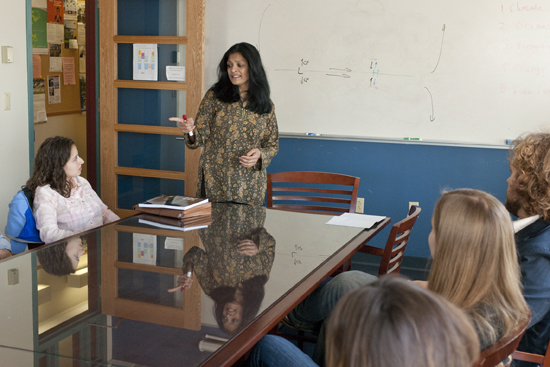Global Change Reaches Middle School
Grant allows shared research, improved lesson plans

“How do you communicate with the general public?” asks Sucharita Gopal, a College of Arts & Sciences professor of geography and environment and principal investigator for a grant funding graduate student work in neighboring middle schools. “That’s the hardest part of science.”
The goal of the five-year, $2.8 million National Science Foundation grant received by a team of BU faculty is to cultivate a new generation of scientists as both solid researchers and effective communicators.
Dubbed GLACIER (GLobAl Change Initiative: Education and Research), the BU project was one of 23 grants awarded for the NSF GK-12 Fellows Program. At least a dozen professors from five departments, geography and environment, biology, earth sciences, and statistics in CAS and mechanical and electrical engineering in the College of Engineering, will supervise 10 graduate fellows in yearlong placements in Cambridge or Brookline schools. The goal is to get these fellows working with public school teachers to improve lesson plans about a most important topic.
“In the 21st century, global change is one of the biggest things you can study to make a difference,” Gopal says.
Professors from the five departments handpick the fellows, who must be U.S. citizens, have completed most of their doctoral course work, and be willing to dedicate 10 to 15 hours each week to an assigned school. Fellows receive a $30,000 stipend and $10,000 to attend a required yearlong seminar course.
The structure is designed to encourage benefits all around. Brookline and Cambridge teachers come away with an innovative global change curriculum and learn new technologies, such as GIS, GPS, and remote sensing. Fellows share their research findings, while learning how to explain them in layman’s terms. BU faculty gain links to the surrounding community and interact with professors from related disciplines.
And middle school students learn how human actions can effect global change.
“They are the ones who have to adapt when things happen,” says future fellow Michael Mann (GRS’12).
 Gopal is the principal investigator for a $2.8 million National Science Foundation grant that will fund 10 graduate fellows working in local schools over a five-year period.
Gopal is the principal investigator for a $2.8 million National Science Foundation grant that will fund 10 graduate fellows working in local schools over a five-year period.
Work begins at the end of May for the graduate students, according to Cynthia Brossman, director of the CAS Learning Resource Network and the grant’s program manager. On the agenda are classroom observations, pedagogy courses, and participation in summer outreach programs with middle schoolers. In early August, fellows meet with teachers for an eight-day workshop to develop lesson plans.
“Summer training prepares the fellows so that when they start in September they can hit the ground running,” Brossman says. Part of that work is helping teachers understand fellows’ role in classrooms. “We try to dispel the student-teacher model,” she says, adding that fellows don’t grade or clean classrooms. “This is really someone who has content expertise.”
Lessons will center on five themes: the atmosphere, the hydrosphere, the biosphere, energy conservation and sustainability, and data measurement and analysis. Students will measure local rainfall and temperature, take carbon emissions readings, and make field trips to Walden Pond and Harvard Forest.
Information gathered will be plugged into another NSF-funded project under the geography and environment department.
Gopal says an international component may be woven in later; University professors may get funding to travel with fellows and teachers to research sites like Antarctica.
Fellows can continue for a second year, depending on demand for the program and their progress in their doctoral studies. “It gives graduate students another level to their education,” Brossman says. “It makes them more marketable.”
These “resident scientists,” as the NSF calls them, are ready to work. Doctoral student and future fellow Valerie Pasquarella (GRS’14) will help display complex data in user-friendly forms, such as drawings, maps, and graphs. And Mann plans to share his knowledge of economically appropriate land use, specifically in the Brazilian Amazon.
Gopal notes one of Mann’s special achievements: he built a bike almost entirely of bamboo.
“Who wouldn’t want to be taught,” she says, “from people who are cool like them?”
Leslie Friday can be reached at lfriday@bu.edu; follow her on twitter @lesliefriday.
Comments & Discussion
Boston University moderates comments to facilitate an informed, substantive, civil conversation. Abusive, profane, self-promotional, misleading, incoherent or off-topic comments will be rejected. Moderators are staffed during regular business hours (EST) and can only accept comments written in English. Statistics or facts must include a citation or a link to the citation.